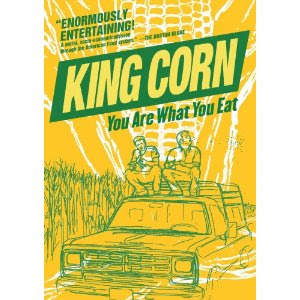“Nutritionism involves not only a nutritionally reductive approach to food but also a reductive approach to understanding the body and bodily health” (Scrinis, 42).
“American culture’s treasured doctrine of the perfectible body is deeply indebted to Christian currents that have perceived the body as central for pushing the soul along the path to progress” (Griffith, 38).
“We aren’t growing quality. We’re growing crap.” (King Corn)
How have we become so disconnected from the food we eat? We spend a large portion of our incomes on it. We put it in our mouths. It travels through our intestines, giving us the fuel we need for our high-energy lives. And, perhaps most importantly, most would, at least to some extent, agree with the age-old cliché “You are what you eat.”
So, if we are indeed what we eat, what are we eating? How do we think about food? How do we conceptualize the relationship between food, health, our sense of self, and our bodies?
First of all, according to visualeconomics.com, this is what we’re eating.
This depiction of the average, 36.6-year-old American is undoubtedly disturbing. How could it be possible to consume 29 pounds of french fries, 53 gallons of soda, and 24 pounds of artificial sweeteners? Perhaps even more disturbing is the incredible corn consumption. The average American eats 56 pounds of corn and 42 pounds of corn syrup each year. How is this possible?
King Corn, a food documentary, follows two young men on their journey from Boston to rural Iowa to plant an acre of corn. Consequentially, the film explains how corn sneaks its way into our diets:
Food documentaries such as King Corn are working to expose the atrocities of our food system by providing consumers with information that is not as readily available as one would think. As such an intimate part of our lives, food needs to be reevaluated and thought about more holistically, taking into consideration not only the consequences of food at the individual level, but also the agricultural system, the environment, and sustainability.
Food, Inc., another documentary, exposes problems with the food system and encourages people to rethink food:
Though rather thorough in scope, these documentaries only begin to get at the American food complex. In a society obsessed with the notion of health, how can it make sense to unknowingly consume so much high fructose corn syrup? Shouldn’t we know what we’re eating?
Gyorgy Scrinis’ article addresses the ideology or paradigm of nutritionism as a reductive approach to food. “This focus on nutrients has come to dominate, to undermine, and to replace other ways of engaging with food and of contextualizing the relationship between food and the body” (39). She critiques the modern conceptualization of nutrients and diets, claiming that “nutritionism promotes the idea that the perceived problems with contemporary diets can be tackled by the more or less precise quantitative tinkering of the nutrient profile of foods and diets – by nutritional tinkering – rather than by means of more far-reaching qualitative changes in diets and the types of foods eaten” (43). Indeed, this superficial approach to food makes more holistic approaches (such as the ideology of Food, Inc.) seem shocking. Scrinis also argues that “nutri-qualification” manipulates the categorization of foods, blurring distinctions between various kinds of foods, such as processed and unprocessed, plant-based or animal-based.
Furthermore, Scrinis discusses issues around focusing on nutrients as opposed to food as a whole. “The more extensively a food is processed, the more opportunities there are for its nutrient profile to be engineered according to the latest nutritional fetish” (43). Therefore, over-processing of foods fuels the nutritional fetish, creating a toxic cycle. This cycle leaves less room for the autonomy of the consumer in making decisions about food. Additionally, Scrinis presents the idea of “wonder foods” as necessary to attain health and how this phenomenon “overrides the preference for local and seasonal foods, as well as the need to reduce meat consumption to minimize the environmental impacts of animal production” (44). This occurrence is also addressed in Food, Inc., which emphasizes the importance of eating locally grown foods.
In the article “Don’t Eat That: The Erotics of Abstinence in American Christianity,” Marie Griffith explores the role of Christianity in forming opinions about food. In linking food and religion, she claims that few authors “question the belief that following God means taking a deeply suspicious stance toward food” (42). She continues by stating that
“like the lifeless body that no longer hungers, so should living Christians adopt indifference toward food” (43). According to this logic, the stomach turns into a God if food is given too much importance (43). Thus, good Christians must distance themselves from the appeal of food.
Griffith also discusses Shamblin’s image of “food as a seductive lover who entices the overeater away from the true husband, God” (45). This claim portrays the Christian idea of food as something to distrust and loathe (45). Though Christian authors may adhere more closely to the body standards of American pop culture than they would like to admit, their writings “provide biblical justification for their reader’s desire to be lean and appealing” (46). This phenomenon suggests a moral component of food, and an integral connection between body image, health, and food.
Though the relationship between food, health, and self is extremely complicated, I feel this relationship is too often oversimplified and pushed to the sideline in a society that is simultaneously obsessed with (yet overwhelmingly ignorant about) food. We must continue to question not only how our food is produced, but also how our perceptions of food are informed by the very people who try to poison us with corn by-products.
Bibliography
Griffith, Marie R. 2001. “’Don’t Eat That’: The Erotics of Abstinence in American Christianity.” Gastronomica 1(4): 36-47.


No comments:
Post a Comment